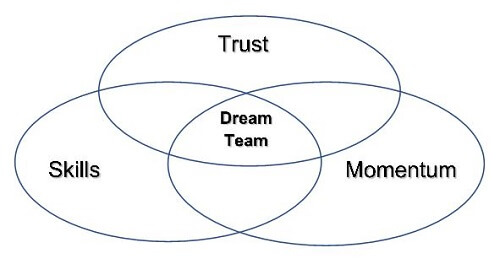How to Build a Fundraising Dream Team
No matter how much we want every board member to be all-in on fundraising, some of us have to live and work on planet Earth. It may be that what you need to build to actually get money in the door is a fundraising Dream Team. And, you may need to look beyond your board to make it happen. Key attributes of the Fundraising Dream Team include: a high level of trust, skills to accomplish the work, and momentum to propel the group forward and keep everyone at the table beyond the first house party.
Start by choosing members of the team wisely. Each of these volunteers should possess a passion for your mission work, be relationship-oriented (read: play well with others), and be willing to make a gift of their own.

Trust. Often the best fundraising team emerges organically as like-minded fundraising volunteers gravitate toward one another. This is nearly always a “happy accident.” In other cases, you may need to build relationships on the team before the serious work of fundraising begins. Take time from the start to build trust among team members. Some of this is chemistry, so you’ll need to give this some thought before you reach out, imaging how people with different personalities might “fit” together on a team; but often it comes down to sharing stories and spending time together, breaking bread or just socializing. Failing to spend time solidifying these relationships early will make the team less effective, for a number of reasons. First, folks need to feel comfortable sharing their strengths as well as those areas that they don’t feel particularly strong in before you begin making job assignments. Second, with trust you can share challenges and learn from them without feeling like you’re going to be “voted off the island.” In addition, building trust early on will mean that over time the group can become a self-managed team that is less dependent on staff for motivation. Finally, this work will require that the volunteers spend a lot of time together, so it’s better if they know and like each other.
Skills. You’ll want to provide the skill-building training that these volunteers need to succeed. I have found that if you ask volunteers if they are excited about asking for money, you can often hear a pin drop; but if you ask them if they are willing to learn new skills to be more adept in fundraising, they respond more favorably. In fact, I can’t remember a board member or other fundraising volunteer turning down an opportunity to build skills needed to support their cause. It helps if this training can be led (or at least coordinated) by a volunteer who is liked and respected within the group and who has some past fundraising experience. Often, training amounts to sharing basic fundraising principles and getting team members comfortable with the idea of asking for support. Strange as it may seem, “training” is often a simple matter of honoring the wisdom and experience in the room. Volunteers (like almost everyone else) have a wildly inaccurate view of their own ability to tell their own story and persuade others to support their cause. Acknowledging the existing power and potential in the room is Job One for any fundraising trainer.
Momentum. And, speaking of the power of acknowledgment, you’ll want to create a few “early wins” and praise them like crazy. I find it’s helpful to allow the group to choose its first projects and not to insist that they think too big initially. A few years ago, I helped to organize a group of volunteers who were trying to raise funds for a free clinic. They spent time getting to know each other and building skills through a series of informal “trainings” that were fueled by ideas from the more experienced members (and, truth be told, a few bottles of wine). Then they decided to raffle off a Harley to raise funds for the clinic. Naturally, I was skeptical. But the group embraced the project, everybody sold a bunch of tickets to their friends and family, and in the end, they raised over $25,000 — not huge, but not bad for a first effort. Since that time the group has grown, and they’ve raised hundreds of thousands of dollars for the clinic. Taking time to create momentum with an early win, however small, can create the confidence and momentum needed to set your Dream Team on the path to success.


Comment section